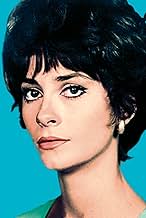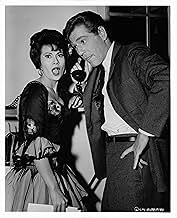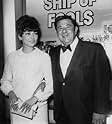ÉVALUATION IMDb
7,1/10
7,2 k
MA NOTE
Un groupe hétéroclite de passagers à bord d'un paquebot en route pour l'Allemagne d'après-guerre incarne un microcosme de la société des années 1930.Un groupe hétéroclite de passagers à bord d'un paquebot en route pour l'Allemagne d'après-guerre incarne un microcosme de la société des années 1930.Un groupe hétéroclite de passagers à bord d'un paquebot en route pour l'Allemagne d'après-guerre incarne un microcosme de la société des années 1930.
- A remporté 2 oscars
- 5 victoires et 13 nominations au total
José Ferrer
- Siegfried Rieber
- (as Jose Ferrer)
José Greco
- Pepe
- (as Jose Greco)
Heinz Rühmann
- Julius Löwenthal
- (as Heinz Ruehmann)
Histoire
Le saviez-vous
- AnecdotesVivien Leigh was subject to bouts of depression and alcoholism and was abrasive to fellow actors. There was a rocky start to her relationship with Lee Marvin, complaining about his stale alcohol breath. Eventually, the two became highly unlikely good friends.
- GaffesAlthough set in 1933, the hairstyles and costumes are decidedly mid-1960s.
- ConnexionsEdited into Spisok korabley (2008)
Commentaire en vedette
One of my favorite indulges over the years has been "Ship of Fools," a 1965 glossy, episodic entertainment done strictly grand scale. Based on Katherine Anne Porter's epic novel, the Oscar-nominated "Best Picture" centers on a sundry group of travelers circa 1933 who clash "Grand Hotel" style on a German ocean liner bound, via Mexico, for Germany (and impending doom it would seem) just as strong Nazi sentiment was breeding. The ship becomes a microcosm of pre-WWII life and mores, with a plethora of subplots alternately swelling and ebbing throughout - situations that alter the course of some of its passengers and crew members, for better or worse.
From the clever opening collage of credits (don't miss this part) set to a catchy, flavorful Latin score to its fascinating all-star disembarkation at the end, it's smooth sailing for most of this trip, guided with an assured hand by the always capable Stanley ("Judgment at Nuremberg") Kramer, with certain cast members (Simone Signoret, Oskar Werner, Vivien Leigh, Lee Marvin, Michael Dunn) coming off better than others (José Ferrer, Elizabeth Ashley, George Segal).
A number of compelling vignettes acted out by the choice, eclectic ensemble make up for the sometimes turgid melodramatics that occur on board as our "ship of fools" are forced to examine their own pride and prejudice while victimized by others. Who can forget the tormented Simone Signoret and Oskar Werner (both Oscar-nominated) as the morphine-addicted political prisoner and dutiful ship's physician who provide the film with its most poignant and tragic shipboard romance. Their clandestine encounters are exquisitely written and beautifully realized. Or Vivien Leigh's coy, aging elitist, Mary Treadwell, who delivers a brilliantly despairing monologue in front of a makeup mirror that, in turn, sets up a wildly climactic shoe-bashing scene with Lee Marvin's besotted baseballer when he viciously assaults, then profusely apologizes to the now-humiliated matron after mistaking her in the dark for a cooch dancer. Or José Greco & company's steamy, frenetic flamenco sequence during a raucous, after-hours party. Or dwarf actor Michael Dunn's sublime Greek Chorus that effectively bookends the movie (the Oscar-nominated Dunn subsequently played evil Dr. Loveless on TV's "Wild, Wild West" series). These glorious scenes and more help to balance out the less serviceable ones, particularly those involving Jose Ferrer's boisterous, irritating Nazi bigot who borders on caricature, and Elizabeth Ashley and George Segal's turbulent lovers who come off dull and forced.
Ernest Laszlo's lustrous black-and-white cinematography was suitably Oscar awarded, while the whole look, feel and tone of the movie is decidedly old-style theatre at its best. This movie has remained one of my all-time favorite wallows.
From the clever opening collage of credits (don't miss this part) set to a catchy, flavorful Latin score to its fascinating all-star disembarkation at the end, it's smooth sailing for most of this trip, guided with an assured hand by the always capable Stanley ("Judgment at Nuremberg") Kramer, with certain cast members (Simone Signoret, Oskar Werner, Vivien Leigh, Lee Marvin, Michael Dunn) coming off better than others (José Ferrer, Elizabeth Ashley, George Segal).
A number of compelling vignettes acted out by the choice, eclectic ensemble make up for the sometimes turgid melodramatics that occur on board as our "ship of fools" are forced to examine their own pride and prejudice while victimized by others. Who can forget the tormented Simone Signoret and Oskar Werner (both Oscar-nominated) as the morphine-addicted political prisoner and dutiful ship's physician who provide the film with its most poignant and tragic shipboard romance. Their clandestine encounters are exquisitely written and beautifully realized. Or Vivien Leigh's coy, aging elitist, Mary Treadwell, who delivers a brilliantly despairing monologue in front of a makeup mirror that, in turn, sets up a wildly climactic shoe-bashing scene with Lee Marvin's besotted baseballer when he viciously assaults, then profusely apologizes to the now-humiliated matron after mistaking her in the dark for a cooch dancer. Or José Greco & company's steamy, frenetic flamenco sequence during a raucous, after-hours party. Or dwarf actor Michael Dunn's sublime Greek Chorus that effectively bookends the movie (the Oscar-nominated Dunn subsequently played evil Dr. Loveless on TV's "Wild, Wild West" series). These glorious scenes and more help to balance out the less serviceable ones, particularly those involving Jose Ferrer's boisterous, irritating Nazi bigot who borders on caricature, and Elizabeth Ashley and George Segal's turbulent lovers who come off dull and forced.
Ernest Laszlo's lustrous black-and-white cinematography was suitably Oscar awarded, while the whole look, feel and tone of the movie is decidedly old-style theatre at its best. This movie has remained one of my all-time favorite wallows.
- gbrumburgh
- 7 mars 2001
- Lien permanent
Meilleurs choix
Connectez-vous pour évaluer et surveiller les recommandations personnalisées
- How long is Ship of Fools?Propulsé par Alexa
Détails
Box-office
- Budget
- 4 000 000 $ US (estimation)
- Brut – à l'échelle mondiale
- 206 $ US
- Durée2 heures 29 minutes
- Couleur
- Mixage
- Rapport de forme
- 1.85 : 1
Contribuer à cette page
Suggérer une modification ou ajouter du contenu manquant

Lacune principale
By what name was La Nef des Fous (1965) officially released in India in English?
Répondre



























